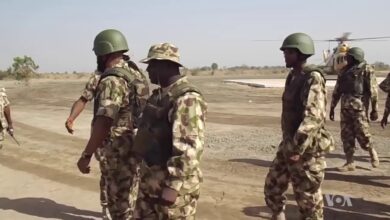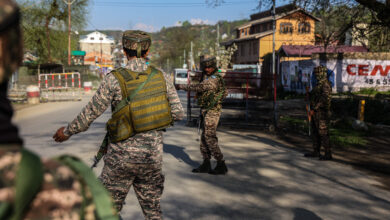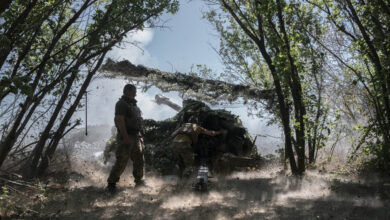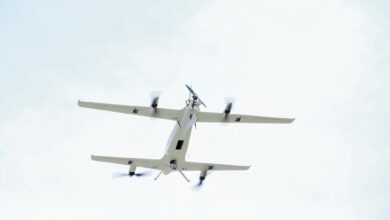Boko Haram jihadists attacked two military bases in Nigeria’s restive northeast, killing one soldier and wounding several others, security sources told AFP on Wednesday, November 5, in a week that saw a further ramping up of insurgent assaults on troops.
Riding in technicals – trucks fitted with anti-aircraft guns – fighters from the Islamic State West Africa Province faction of Boko Haram on Tuesday launched an assault on a military base in Gudumbali town in Borno state, sparking a fierce firefight in which two soldiers were injured, a military officer said.
“It was a tough battle,” said the officer who asked not to be named as he was not authorised to speak to the media.
“Troops fought hard and repelled the terrorists, two soldiers were injured in the fight,” he said, adding the base was on “high alert” for a follow-up attack.
Gudumbali was also attacked by Boko Haram in early September. Thousands of civilians were forced to flee after militants took control of the town before withdrawing the following day.
Attack on Mallam Fatori repelled with air support
On Monday, ISWAP fighters attacked a military base in Mallam Fatori, a Borno state town near the borders with Niger and Chad.
The attack was repelled with air support, according to two military sources, who said a soldier was killed and several others were injured in the attack.
When the Mallam Fatori base was attacked, it was already sheltering a contingent of soldiers who had abandoned another base near the fishing town of Baga on the shores of Lake Chad.
The soldiers had run out of ammunition during a fierce gun battle in Arege on November 30, in which one was killed and seven injured. The same base had also been attacked two days earlier.
“They didn’t received supplies and decided to leave the base and move to Mallam Fatori on Saturday,” the first military officer said.
“They had no ammunition to fight in case of renewed attack and had to abandon the base,” said the second military officer.
ISIS on Tuesday claimed ISWAP fighters “attacked a barracks of the Nigerian army” in Mallam Fatori resulting in “the death and injury of a number of them.”
Boko Haram attacks increase
Boko Haram split into two factions in mid-2016 over ideological differences. One is led by Abu Mus’ab Al-Barnawi and largely focuses on attacking military and government targets, while the other, led by Abubakar Shekau, is notorious for suicide bombings and indiscriminate killings of civilians.
ISIS central gave its formal backing to the Barnawi faction, which is known as Islamic State West Africa Province. It has lately intensified its armed campaign, launching a number of major assaults on military targets in Borno and neighbouring Yobe state amid signs of a takeover by more hardline leaders.
Since July, AFP has reported at least 22 attacks on military bases and positions in Borno and Yobe. ISIS has claimed that ISWAP is responsible for most of them.
An ISWAP attack on December 1 in Buni Gari village, in Yobe state, left eight soldiers dead, the Nigerian army said on Tuesday, while ISIS claimed ISWAP fighters killed 17 soldiers.
Sources told AFP that air support and reinforcements from a military base in the nearby town of Buni Yadi helped push the militants out.
On December 1, ISIS claimed ISWAP killed eight Nigerian soldiers and wounded 17 others in an attack near Gamboru in the Lake Chad area, close to the border with Cameroon. The Nigerian Army said that it captured weapons and stores during “offensive patrols” against Boko Haram in the area, but did not mention army casualties.
On November 28 three soldiers were killed in attack on a military base in Cross-Kauwa near Lake Chad.
In the most audacious attack on November 18, ISWAP fighters killed at least 43 soldiers when they overran a base in Metele near the border with Niger, although soldiers who survived the raid said more than 100 of their colleagues were killed.
The military on November 28 gave an official figure of 23 deaths, and on November 30 lashed out at what it said was “deliberate and concerted efforts to mislead the public.”
Brigadier General Sani Kukasheka Usman said some media outlets were “creating erroneous impression of the Nigerian Army through inaccurate and false publication of casualty figures.”
The military has even threatened legal action against organisations for publishing unofficial casualty figures.
Borno and Yobe states, along with nearby Adamawa state, have born the brunt of nine years of jihadist violence that has claimed 27,000 lives and forced 1.8 million people to flee their homes.
Last week, President Muhammadu Buhari traveled to N’Djamena to meet leaders from Chad, Niger and Cameroon to discuss how to deal with the surge in violence.
The leaders “expressed the crucial need to change their modus operandi in the fight against Boko Haram” and urged the international community “to support their efforts in the fight against terrorism in the region” in a joint statement after the talks.
Buhari is under pressure to show his administration is winning the fight against Boko Haram ahead of a presidential election in February at which he will seek a second term in office.












